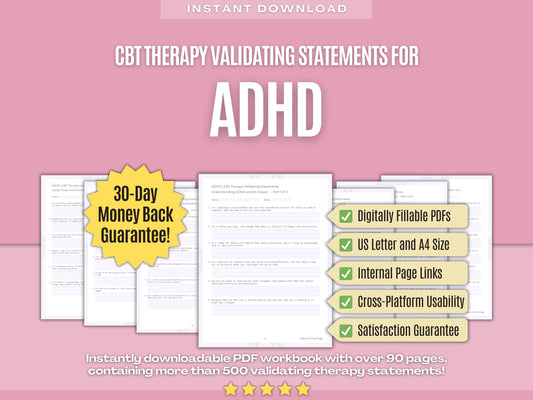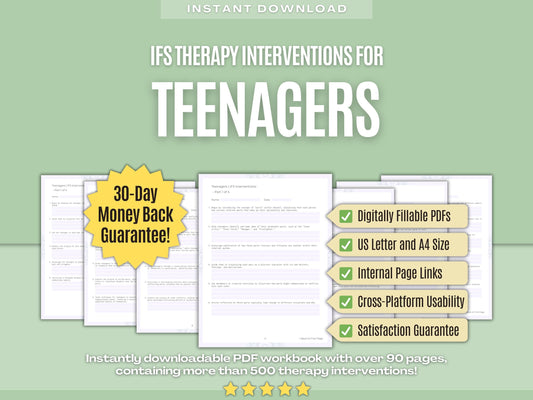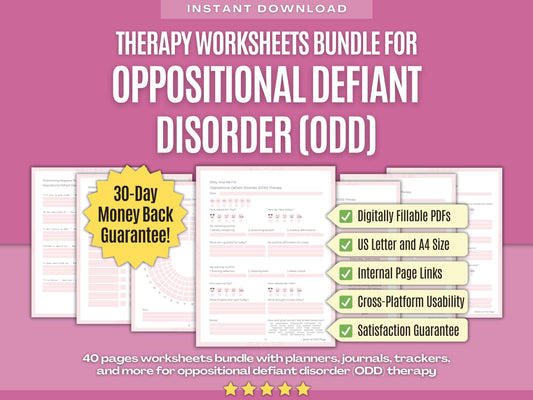Elevate Your Therapy and Guide Your Clients to Inner Healing with Our Oppositional Defiant Disorder (ODD) Therapy Progress Notes! ✨
1. Starting ODD Therapy
- Reviewed treatment goals established during the initial consultation and discussed any changes or updates.
- Explored any challenges or successes the client has experienced since beginning therapy.
- Discussed any changes in the client's environment or circumstances that may impact their treatment progress.
- Explored any resistance or ambivalence the client may be experiencing towards therapy or treatment goals.
- Addressed any setbacks or relapses in behavior and worked collaboratively to develop strategies for managing them.
- Encouraged the client to continue practicing coping skills and techniques learned in therapy in their daily life.
- Explored the client's emotional experiences and identified triggers for oppositional behavior.
- Provided psychoeducation on relevant topics, such as emotional regulation or conflict resolution skills.
- Collaborated with the client to identify and challenge negative thought patterns or beliefs contributing to their ODD symptoms.
- Discussed the role of self-care and stress management techniques in maintaining progress in therapy.
- Provided referrals or recommendations for additional support services or resources as needed.
2. Educating on ODD
- Introduced the concept of Oppositional Defiant Disorder (ODD) to the client and caregivers, explaining its defining characteristics and diagnostic criteria.
- Clarified common misconceptions about ODD, such as attributing challenging behaviors solely to defiance or disobedience.
- Educated the client and caregivers about the differences between ODD and other related disorders, such as conduct disorder and ADHD.
- Provided information on evidence-based treatment approaches for ODD, including cognitive-behavioral therapy, parent training, and family therapy.
- Addressed the impact of ODD on family dynamics and relationships, emphasizing the need for support and understanding from all family members.
- Discussed the importance of communication skills in reducing conflict and improving cooperation between the client and their caregivers.
- Collaboratively explored the client's own understanding of ODD and any questions or concerns they may have about the disorder.
- Addressed any cultural or contextual factors that may influence the client's perception of ODD and treatment options.
- Acknowledged the challenges and stressors associated with managing ODD symptoms and validated the client and caregivers' experiences.
- Offered strategies for managing stress and building resilience in the face of ongoing difficulties related to ODD.
- Encouraged the client and caregivers to advocate for their needs and seek out appropriate services and supports.
3. Mindfulness Strategies for ODD
- Today, we introduced the concept of mindfulness to help manage impulses and emotional reactions commonly associated with ODD.
- We practiced deep breathing exercises to cultivate awareness of the breath as an anchor during moments of distress.
- We discussed the importance of non-judgmental observation of thoughts and feelings to develop self-awareness.
- We explored grounding techniques such as sensory awareness to bring attention to the present moment.
- We introduced body scan meditation as a way to enhance awareness of physical sensations and promote relaxation.
- We discussed the role of acceptance in mindfulness and its potential to reduce resistance to difficult experiences.
- We practiced mindful eating to cultivate awareness of hunger cues, taste sensations, and the act of nourishing the body.
- We explored the concept of "urge surfing" as a way to ride out impulses and cravings without acting on them impulsively.
- We reviewed homework assignments focused on integrating mindfulness practices into daily life.
- We discussed potential challenges and barriers to maintaining a consistent mindfulness practice.
- We revisited the client's goals for therapy, highlighting how mindfulness skills can support progress in managing ODD symptoms.
4. Dialectical Behavior Therapy (DBT) for Emotional Control
- Today's session focused on introducing Dialectical Behavior Therapy (DBT) techniques to enhance emotional regulation skills in individuals with Oppositional Defiant Disorder (ODD).
- We began by exploring the concept of mindfulness as a foundation for developing awareness of emotions without judgment or reactivity.
- We discussed the importance of distress tolerance skills in coping with overwhelming emotions without resorting to maladaptive coping mechanisms.
- We addressed the role of emotion regulation skills in identifying and labeling emotions, understanding their triggers, and implementing healthy coping strategies.
- We introduced the concept of interpersonal effectiveness skills to improve communication and navigate challenging social interactions.
- We explored the use of emotion regulation techniques, such as opposite action and cognitive reappraisal, to modulate intense emotions and promote adaptive responses.
- We discussed the role of validation in DBT and its impact on enhancing self-esteem and reducing emotional reactivity.
- We addressed any challenges or barriers encountered in applying DBT skills outside of therapy sessions, problem-solving to overcome obstacles.
- We reviewed diary cards or logs used to track emotions, behaviors, and skill utilization between sessions, identifying patterns and areas of focus.
- We discussed the importance of self-care and self-compassion in maintaining emotional well-being and preventing burnout.
- We revisited the client's treatment goals, celebrating progress made and setting new objectives for continued growth.
5. Interpersonal Therapy (IPT) for Social Skills
- Today's session focused on implementing Interpersonal Therapy (IPT) techniques to improve social skills and enhance interpersonal relationships in individuals with Oppositional Defiant Disorder (ODD).
- We began by discussing the client's social history and identifying patterns of communication and interaction with others.
- We explored the client's interpersonal problems and identified specific goals for improving social functioning.
- We discussed the role of communication styles and how assertive communication can promote mutual respect and understanding.
- We addressed the client's difficulty in recognizing and managing emotions in social situations, focusing on emotion regulation skills.
- We explored the impact of ODD symptoms on social interactions and discussed ways to manage impulsivity and anger in social settings.
- We discussed the importance of empathy and perspective-taking in building and maintaining healthy relationships.
- We addressed the client's difficulty in making and maintaining friendships, exploring barriers to social connection and opportunities for growth.
- We discussed strategies for managing social anxiety and increasing confidence in social situations.
- We reviewed homework assignments focused on practicing social skills in real-life situations and monitoring progress.
- We revisited the client's social goals, celebrating progress made and setting new objectives for continued growth.
6. Emotion-Focused Therapy (EFT) for Emotional Awareness
- Today's session focused on implementing Emotion-Focused Therapy (EFT) techniques to enhance emotional awareness and regulation in individuals with Oppositional Defiant Disorder (ODD).
- We began by discussing the importance of emotional awareness in understanding and managing oppositional behaviors.
- We explored the connection between emotions and behaviors, discussing how unexpressed or suppressed emotions can manifest as defiance or aggression.
- We discussed the concept of emotional regulation and the role of coping strategies in managing intense or overwhelming emotions.
- We addressed any barriers or resistance to experiencing emotions, exploring underlying fears or beliefs that may hinder emotional expression.
- We explored the client's emotional triggers and patterns of emotional reactivity, identifying opportunities for intervention.
- We discussed the impact of early attachment experiences on emotional regulation and interpersonal relationships.
- We addressed the role of empathy and compassion in fostering emotional connection with others and resolving conflicts.
- We discussed strategies for effectively communicating emotions and needs in interpersonal interactions, promoting healthier relationships.
- We revisited the client's emotional goals, celebrating progress made and acknowledging areas for continued growth.
- We discussed strategies for maintaining gains and preventing relapse, including ongoing practice of emotion-focused techniques and seeking support when needed.
7. Psychodynamic Approaches to Underlying Issues
- Today's session focused on utilizing psychodynamic approaches to explore underlying issues contributing to Oppositional Defiant Disorder (ODD) symptoms.
- We began by discussing the basic principles of psychodynamic therapy, emphasizing the importance of exploring past experiences and unconscious motivations.
- We explored the client's early attachment relationships and family dynamics, examining how they may shape interpersonal patterns and coping strategies.
- We discussed the concept of defense mechanisms and how they function to protect the individual from anxiety-provoking thoughts or feelings.
- We addressed the client's resistance to change or insight, exploring underlying fears or conflicts that may contribute to their reluctance.
- We discussed the role of the therapist as a neutral observer and interpreter of the client's unconscious material, providing insight and guidance.
- We addressed any ambivalence or resistance to exploring unconscious material, working to create a safe and supportive therapeutic environment.
- We explored the concept of attachment theory and its relevance to the client's current relationships and emotional patterns.
- We discussed ways in which unresolved childhood experiences or traumas may manifest in current symptoms and behaviors.
- We explored the impact of early developmental experiences on the client's sense of self-worth and identity.
- We discussed ways to cope with the anxiety or discomfort that may arise from exploring unconscious material, including grounding techniques and self-care strategies.
8. Music Therapy for Emotional Regulation
- Today's session focused on utilizing music therapy techniques to promote emotional regulation in individuals with Oppositional Defiant Disorder (ODD).
- We began by discussing the role of music in regulating emotions and promoting relaxation and stress reduction.
- We explored the client's preferences for different types of music and discussed how certain genres or melodies may evoke specific emotions.
- We discussed the client's emotional state before and after engaging in music therapy exercises, noting any shifts or changes in mood.
- We addressed any resistance or discomfort the client may have experienced during the music-making process, providing validation and support.
- We discussed the therapeutic metaphor inherent in the music-making process, using sound and rhythm as a means of externalizing and processing emotions.
- We explored the client's response to different types of music, identifying pieces that evoke feelings of calmness, joy, or sadness.
- We discussed the role of music in facilitating emotional catharsis and release, allowing the client to express and release pent-up emotions.
- We addressed any self-judgment or critical thoughts that may have arisen during the music-making process, encouraging self-compassion and acceptance.
- We revisited the client's favorite musical pieces or compositions, using them as tools for emotional regulation and self-soothing outside of therapy.
- We discussed ways to incorporate music into daily life as a means of promoting emotional well-being and self-care.
9. Wrapping Up Therapy Sessions
- Today's session focused on wrapping up therapy sessions and reflecting on the progress made throughout the therapeutic journey.
- We began by discussing the purpose of wrapping up therapy sessions and acknowledging the client's growth and accomplishments.
- We explored the client's experiences in therapy, discussing moments of insight, challenge, and transformation.
- We discussed any lingering concerns or unresolved issues that the client may want to address before concluding therapy.
- We addressed any fears or anxieties the client may have about ending therapy, providing reassurance and validation.
- We discussed strategies for maintaining gains and preventing relapse, including ongoing self-care practices and support networks.
- We addressed the therapeutic relationship and expressed appreciation for the connection and trust that has been developed between therapist and client.
- We discussed the importance of celebrating progress and acknowledging the client's resilience and determination throughout the therapeutic journey.
- We reviewed any tools or techniques that have been particularly helpful for the client and discussed how they can continue to utilize them moving forward.
- We discussed the option of scheduling follow-up sessions or accessing additional support services if needed in the future.
- We discussed the importance of self-compassion and self-care in maintaining emotional well-being and resilience.
10. Concluding the Therapeutic Journey
- Today's session focused on concluding the therapeutic journey and reflecting on the progress made throughout the course of therapy.
- We began by discussing the purpose of concluding therapy and acknowledging the client's growth, resilience, and accomplishments.
- We explored the client's experiences in therapy, discussing breakthrough moments, challenges overcome, and insights gained.
- We revisited the goals set at the beginning of therapy, reflecting on the progress made towards achieving them.
- We addressed any fears or anxieties the client may have about ending therapy, providing reassurance and validation.
- We discussed strategies for maintaining progress and coping with challenges independently, including self-care practices and support networks.
- We discussed the importance of celebrating milestones and acknowledging the client's resilience and determination throughout the therapeutic journey.
- We addressed the therapeutic relationship and expressed appreciation for the connection and trust that has been developed between therapist and client.
- We reviewed any tools or techniques that have been particularly helpful for the client and discussed how they can continue to utilize them moving forward.
- We discussed the option of scheduling follow-up sessions or accessing additional support services if needed in the future.
- We discussed the importance of self-compassion and self-care in maintaining emotional well-being and resilience.
We hope that our therapy progress notes for Oppositional Defiant Disorder (ODD) therapy will help you to elevate your therapy practice and guide your clients to inner healing! Do you need more therapy progress notes for Oppositional Defiant Disorder (ODD) therapy? Find them all in our Digital Workbook! Or do you have any questions or suggestions for us? Please feel free to contact us at any time!


















